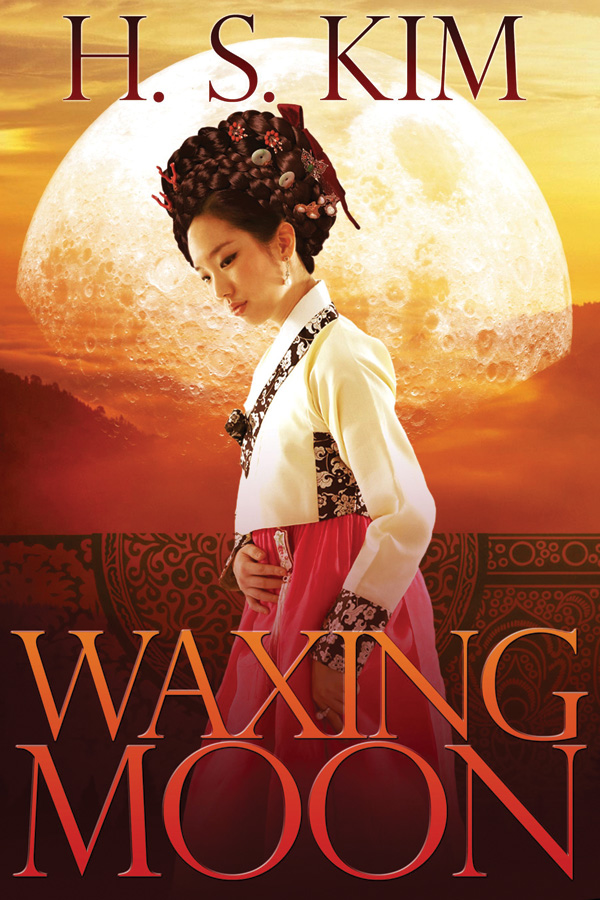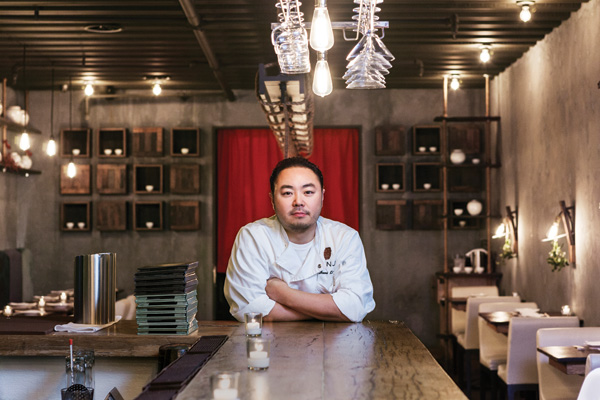by JONATHAN CHA
During a waxing moon, the moon grows, changing from a new moon into a full moon. The increase in illumination, especially the intensity of light from our neighboring celestial body, harkens positive change, such as spells for luck, love and growth. It is a time of new beginnings and ideas.
H.S. Kim captures the power of this shift through the women of 19th-century Korea, as they endure life-altering events that expand in both scale and tragic momentum in concert with the lunar cycle. Set in the mid-1800s, the narrative overflows with relationships, often more competitive than amicable, both built and destroyed in the face of life and death. From Mrs. Wang, the wise and frank midwife, to the conniving Mistress Yee and to Nani, the young maid aspiring for a better life, Kim carefully crafted a community of characters seeking to master their respective universes as twilight falls on the Joseon Dynasty.
The journey of any writer similarly seems to follow a path of cycles, a series of slight, approximate and complete alignments of both story and opportunity. Kim left Korea and began her quest in the U.S. as a 20-year-old prepped to pursue an undergraduate degree at the University of Washington in pre-med. After experiencing some intriguing plot twists of her own, including a stint teaching at a correctional facility in upstate New York, she settled in Berkeley, in Northern California, where KoreAm sat down with her to chat.
What inspired you to write a novel about the daily lives of Korean women with the end of the Joseon Dynasty as your backdrop?
Kim: I wrote the novel for anybody who doesn’t know about Korean history. I wrote it in English because I wanted to share it with people in this country. Often people are very surprised if I say Korea is almost 5,000 years old. They think that it is a new country. All they know is high-tech, barbecue, Samsung and stuff like that. I wanted to write something that gives them perspective, the history of Korea, which is even more interesting than what is going on now. I wanted to show that women were as strong as men at this time and that Korean women were not docile. I think the structure of Korean society was set up in a way that women were oppressed. There were not many opportunities, but they were as strong as any other group of women in other countries around the world.
Who would you say is the main character?
Most of the women become the main character when they appear. I wanted them to be the central characters. They are more interesting. In some ways, the men did whatever outside, their duties, but women were more creative thinkers because they were stuck inside, and they saw what was going on. When you observe, you become more creative. They have a lot of reserved energy that they haven’t exerted, and I think that they can use that with their mind in the household. Since this is a story within this household, a lot more is going on in their heads. Men do not see what is going on in the house because, during this time period, they would come home and stay in their quarters. Women see everything. They have a bird’s eye view.
 H.S. Kim, author of Waxing Moon. (Photo courtesy of Eric Crapo)
H.S. Kim, author of Waxing Moon. (Photo courtesy of Eric Crapo)
Did you draw on any personal experiences while crafting your characters?
Once they come to life, to exist on the page, then the characters almost do their own thing. I almost felt possessed in some ways when I wrote this book. I did come from a family of very strong women. My grandmother was married, but her husband had a second wife, secretly, and she left him. That was unheard of. You would stick to it no matter how many wives he brings. You stay with him. But, she just said, forget this guy. She had no place to go. So, she went to live in a Buddhist temple and pretended she was a nun. I would visit her during summer vacation. No grandchildren wanted to be with her at a temple because it was very remote and quiet. For some reason, I wanted to go, so I stayed with her. In retrospect, it was really fun. When I would get there, she would want to go get pork barbecue somewhere. So, we would leave together and gobble down barbecue.
How did you transition from pre-med to English literature?
My English was not good enough for anything else. I wanted to focus on science and math, where you need to know numbers and formulas. My second year [of college], I became really interested in literature, but it was so daunting. When I took a creative writing class, I dropped out because the professor, after reading my first draft, said I needed a tutor to correct my grammar. He couldn’t give me that kind of help. I was so embarrassed that I dropped out. I kept doing my pre-med, excelling in physics, organic chemistry, biology and math.
[But] my heart was really in English literature. My third year, I started taking literature classes and loved it, despite my falling grades, and I met some really amazing professors who helped me. One in particular, Harold P. Simonson—he was a phenomenal professor—opened the door to world of literature for me. Even after I graduated, I would send him a short story, and he would send me a poem. He sent me a handwritten copy of his book, Going Where I Have to Go, before publication. He wrote all of my recommendations anywhere I went, any job that I got. I kept all of his letters. I want to write about him someday.
I understand that after getting your master’s in English Education at Columbia, you taught at the Cayuga Correctional Facility in upstate New York.
After I got my master’s, it was very difficult to get a job. I had this short-term middle school position in Ithaca that ended. I looked around and decided to take the job. I refused to use the computer system to check what my students did. I didn’t want to know their crimes. If I did know, then it would have become an obstacle. I would think about what they did, not think of them as human beings. I would have seen them as only criminals. I didn’t want to look at my students that way. They are there to learn. I didn’t care what they did in the past. It was irrelevant.
How would you describe your experience at Cayuga?
I had a really good experience there. I taught an inmate that didn’t know how to read in English or Spanish. When he was able to write his name, he started crying. I was so happy. We were so happy together. He said, “Teacher, I wrote my name.” Another inmate came to me after a test and got a “B.” He asked me to give him an “A” because his parents were visiting and he wanted to show them. I gave him an “A” and told him that he needs to do extra credit.
It was funny that even in prison this student needed to get an “A” for his parents. Some other students asked me how much I made. It was $25 an hour at that time. One inmate couldn’t believe how much I made for going through so much trouble. So he writes a phone number and the name of his friend on a piece of paper. He tells me, “Teacher, I want you to call my friend. Do whatever he says one time, and you will get $50,000. Quit your job and go do this.”
It was his way to let me know he appreciates me. He wanted me to make more money. He also trusted me. When I left, several of the prisoners promised, “I will take you out to dinner in 2020. Wait for me.” I’m expecting to go to a very expensive dinner with these guys.
___
This article was published in the October/November 2014 issue of KoreAm under the title “Writing in Cycles” Subscribe today! To purchase a single issue copy of the magazine issue, click the “Buy Now” button below. (U.S. customers only. Expect delivery in 5-7 business days).







